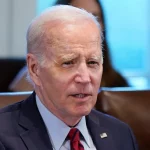
Japan’s Prime Minister Fumio Kishida comes to Washington this week for a potentially critical summit with President Joe Biden — particularly on China, which Tokyo now publicly recognizes as its principal threat.
Just weeks ago, Kishida announced a historical “turning point” in Tokyo’s security policy, vowing to double its defense budget in the next five years to 2% of gross domestic product, NATO’s target level, making Japan’s military topped only by America’s and China’s.
Biden has paralyzed US strategic thinking about Beijing’s menace, obsessed instead with negotiating climate-change issues. Fortunately, our allies have progressed without us.
Before arriving here, Kishida will sign a historic agreement with Great Britain, providing for reciprocal in-country treatment of each other’s servicemembers, thus facilitating joint military exercises and training. While not as far-reaching as Tokyo’s foundational, 1951 status-of-forces agreement with Washington, this new Japan-UK deal is an important step in building Indo-Pacific collective-defense structures.
Moreover, spurred by Russia’s unprovoked aggression against Ukraine and its implications for Asia, Japan is showing new resolve to range far from its immediate region, providing unprecedented aid to Ukraine, including non-lethal military equipment.
These Japanese initiatives parallel British leadership in assisting Ukraine. Since Feb. 24, successive UK governments have consistently outperformed the Biden administration in both political and military support for Kyiv. And in Asia, Britain took a critical catalytic role in forging the trilateral “AUKUS” partnership with the United States to develop and build nuclear-powered submarines for Australia’s navy.
Not all is well, however, in the global West’s reaction to Beijing’s threat, reflecting the continuing, disconcerting lack of American leadership. Germany, for example, stands in sharp contrast to Japan and Britain. Despite Chancellor Olaf Scholz’s declared “sea change” in German security policy just days after Moscow’s attack on Ukraine, Berlin is failing to reach key goals, including increasing defense outlays to 2% of GDP this year and expending €100 billion ($106 billion) on defense assets, such as 30 nuclear-capable F-35s.
What should happen at the Kishida-Biden summit — but probably won’t — is a start on fashioning elements of a new grand strategy to counter China and its growing entente with Russia. Japan’s landmark budget increases, its European outreach and its understanding of the China-Russia threat all contrast dramatically with the Biden administration’s overall timidity.
Kishida should press for considerably greater activity by the Asian “Quad” (India, Japan, Australia and the United States), which Biden to his credit supports, continuing to move its members toward concrete joint action. Mirroring AUKUS, enhancing Japan’s naval capabilities with nuclear-powered submarines, could be enormously beneficial in East Asia.
Biden in turn should show how his defense budgets will help rejuvenate America’s military-industrial base, lest even good ideas like AUKUS impair our own defense capabilities, as both Republican and Democrats fear.
Biden and Kishida should propose making South Korea a full Quad member (forming a “Quint”), which is entirely sensible given the threats from North Korea and China. Indeed, on New Year’s Day, Kim Jong Un ordered “an exponential increase of the country’s nuclear arsenal,” specifically including tactical nuclear weapons to use against the South, which also threaten Japan and deployed American forces.
Even before Kim’s latest threat, South Korea’s President Yoon Suk Yeol was weighing calls to redeploy US nuclear weapons on the peninsula or develop Seoul’s own nuclear weapons.
Japan and South Korea have a long, complicated history, which has prevented extensive trilateral cooperation with Washington. This history is impossible to ignore, but Biden should make every effort to facilitate Tokyo and Seoul coming closer together in collective-defense alignments.
Taiwan’s security, which has enormous, bipartisan support, should also top the Kishida-Biden agenda. Beijing’s belligerence toward Taipei continues to escalate, including Chinese military aircraft’s repeated incursions into Taiwanese airspace.
The world is increasingly, albeit slowly, realizing the need to deter Chinese aggression. Former NATO Secretary General Anders Fogh Rasmussen recently visited Taipei, calling to “further strengthen the bonds between Taiwan and Europe,” an important signal of growing support for the island nation. Closer planning among Japan, America, other Asian partners and NATO allies should be a high priority.
Even Biden officials acknowledge that China’s recent behavior is ever-more belligerent. This week’s Kishida-Biden summit is exactly the right forum both to prove continued allied solidarity against China’s unacceptable conduct and to rally others in Asia and Europe against its growing threat.
John Bolton was national security adviser to President Donald Trump, 2018-19, and US ambassador to the United Nations, 2005-06.